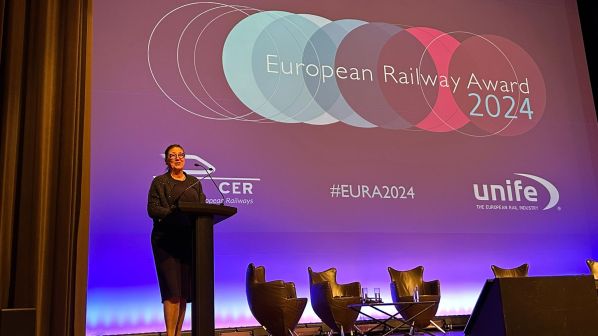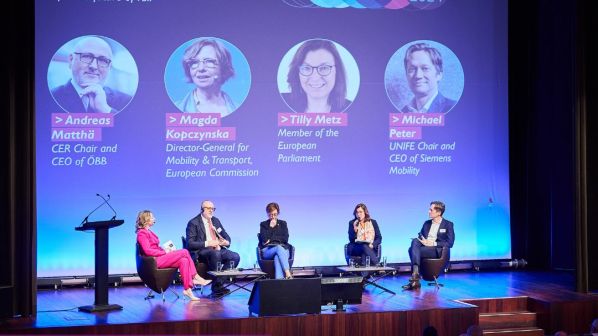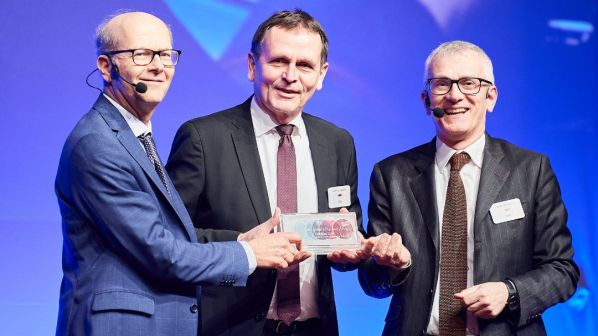THE European Year of Skills was the dominant theme of the European Railway Award held in Brussels on January 29, with award recipients and speakers reflecting on the rail industry’s continuing skills and diversity challenges.
The Rail Champion prize was awarded to former European Union (EU) transport commissioner, Ms Violeta Bulc.
Bulc, who served as the commissioner from to 2014 to 2019, was recognised for her efforts to increase the diversity of the transport sector where women remain under-represented. Indeed, she told the audience that one of her proudest achievements was the increased representation of women working at the European Commission (EC) from 20% when she joined to 43% when she left.
“I am deeply honoured and profoundly touched by the award given to me by the railway community, which I perceive as a testament to the dedicated efforts of the entire transport ecosystem during my tenure,” Bulc said.
“It is also a tribute to the collective excellence of [EC] president, [Mr Jean-Claude] Juncker’s team. Transport serves as the vital thread connecting communities and fostering relationships. When transport functions seamlessly, society thrives; conversely, when transport stops, everything stops. Therefore, those working in the transport sector bear the weight of society on their shoulders.”

This was the 17th edition of the annual event hosted by the Community of European Railways and Infrastructure Companies (CER) and the European Rail Industry Association (Unife). Around 500 hundred people attended the ceremony held at the Royal Museum of Fine Arts of Belgium.
The Rail Trailblazer Award recognised a project to attract, train and retain new talent in the sector. Projects led by Irish Rail (IÉ), Alstom, Siemens, Thales Ground Transportation Systems, and the Baden-Württemberg Department of Transport were all shortlisted for the award. However, Danish State Railways’ (DSB) “Train driver to operator” project to recruit new drivers for the Copenhagen S-Train network was selected as the winner by a jury of policymakers, sector experts and journalists.
Accepting the prize, DSB CEO, Mr Flemming Jensen, explained that the project was driven by the rollout of CBTC on the Copenhagen S-Train network and the change in job profile for drivers from directly operating trains to monitoring the semi-automated driving system.
Jensen said this provided an opportunity to rethink driver training and to reduce the time to qualify from 12 to two-and-a-half months. The result has been an increase in the diversity of applicants which Jensen said better reflects Danish society. The quantity of applications for driving jobs has also increased; there were 800 applications for the first 10 positions compared with around 100 in previous recruitment campaigns. He added that the training programme has been designed with the future full automation of the S-Train network in mind.
“With the development of the S-Train driver training programme, we have created a role that not only establishes a strong foundation for diverse recruitment but also ensures that the position is more in line with technological advancements and future demands,” Jensen said.
The Rail Trailblazer Award included a €10,000 donation to a charity of the winner’s choice, with Jensen selecting the Danish Red Cross, with which DSB has a long-standing affiliation.
Round-table

Skills and diversity challenges in the current and future European labour market were the central themes of a round-table debate at the ceremony.
Steady digitalisation of the rail sector is placing new demands on railway industry personnel, a point which ÖBB CEO, Mr Andreas Mättha, said requires new skillsets for railway workers.
Siemens Mobility CEO and Unife chair, Mr Michael Peter, said that the 17% female representation in the railway industry is reflective of the sector’s traditional reliance on graduates in mechanical and electrical engineering, subjects not particularly attractive to women. However, to address its future challenges, the sector should and must be open to recruiting more people with expertise in mathematics and computer science, disciplines with a higher proportion of female graduates. “As well as improved diversity, the sector will also benefit from different ideas,” Peter said.
Luxembourg MEP, Ms Tilly Metz, called for a wider skills strategy for the rail sector at the European level, building on cross-industry training programme initiatives such as Staffer and Erasmus+, which would be supported by specific EU legislation. “This would emphasise vocational training to address short and medium-term skills needs,” she said.
Ms Magda Kopczyńska, director general for Mobility and Transport at the EC, emphasised the challenges rail faces in attracting talent. Contrary to many people in the room, she said rail and transport are not commonly perceived as a “dream jobs.” However, she feels rail’s role in tackling climate change is one possible selling point.
And while she pointed out that work was underway on skills strategies before the Covid-19 pandemic, including in the European Skills Agenda, Kopczyńska agreed that a new strategy is needed. She said this work must focus on training people to provide the skills necessary to tackle challenges that the sector is not aware of yet. This includes harnessing Artificial Intelligence (AI) to the advantage of the sector, in particular to make up for future labour shortages.
Peter also encouraged the sector to embrace, rather than run away from AI, describing it as having the potential to change working practices across the industry and positioning the sector to overcome future labour challenges.
“We need different profiles of people that will create a different culture that is both innovative and safe,” Peter said. “A change of generation can help us to get to where we need to go. AI is coming. We must not be afraid of it but recognise that AI can be a driver of opportunity.”

